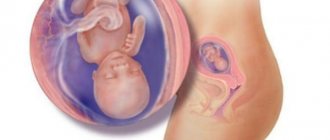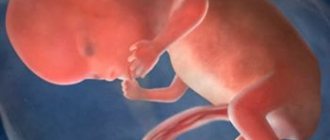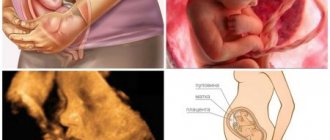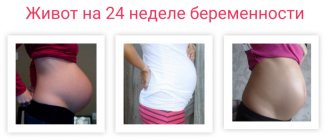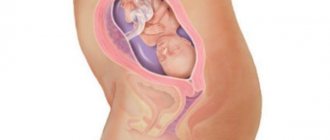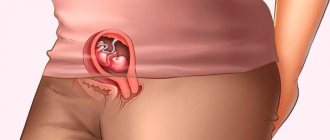Fetal development at 19 weeks of gestation
Fruit size:
20-21 cm.
Fruit weight:
200-230 g.
The 19th obstetric week of pregnancy is the third week of the fifth obstetric month of pregnancy. At this stage, you will probably begin to feel the movements of your baby, while still light tremors bring only delight and tenderness. Your child is actively growing and developing, and you are changing along with him. In this article we will find out what changes are happening this week.
19 weeks, how many months is that? Week 19 is the middle of the 5th obstetric month (19 weeks = 4 months and 13 days or 133 days of pregnancy). You are in your second trimester.
Baby development at 19 weeks of pregnancy
The size of the fruit reaches 20-21 centimeters. The child's weight is 200-230 grams. The baby is the size of a grapefruit.
This week the brain and nervous system continue to actively develop. Nerve endings intertwine the brain and go down the spine to the entire body. Thus, the baby begins conscious movements. The brain is actively developing and forming. The formation of root teeth has begun under the milk teeth. The lungs are also actively developing. The spleen began to perform its function, helping the liver and bone marrow in blood circulation.
Fat is actively collected in the baby's body. The skin is no longer so transparent, it is now red and has folds. On top, the skin continues to be covered with a protective lubricant, which accumulates in the armpits, neck and under the knees. It helps the baby and protects him from bacteria around him. At this time, the skeleton continues to ossify, many cartilages have already become bones.
The child behaves actively, his movements are coordinated. He smiles, yawns, clenches his fingers into a fist. The arms and legs became proportional to the body. Your baby's foot is now about two centimeters in size.
He is constantly, whether sleeping or awake, in motion, turning his neck and has already begun to respond to stimulation from the outside. That is, when you stroke your tummy, he feels it.
His main amusement is what he hears. He is interested in listening to your surroundings; while listening, he reacts to your every sound. And your heartbeat gives him peace. Now the baby is at the peak of development of all five basic senses, the brain has already identified the places responsible for taste, hearing, vision and touch. During this week, be careful with food, as during this period the baby is sensitive to foods containing allergic substances. They can cause allergies to develop after birth.
Fetal development
height: 13-15 cm;
weight: 200 grams The main thing for your baby now is the opportunity to fully grow and improve. You will provide your baby with everything he needs with a proper diet and proper rest. And at this time the fetus:
- the whole body grows;
- the brain is actively developing, the zones responsible for the five basic senses are improving;
- the spleen is “connected” to the formation and strengthening of the immune system;
- the neck muscles are strengthened so that the born baby can already turn his head;
- the movements of the fingers and toes are improved, they bend in all tiny joints;
- the amount of subcutaneous fat increases;
- the respiratory system continues to develop;
- girls are actively forming eggs, and with a large supply (several million of them);
- For approximately eighteen hours every day, the fetus is at rest, the rest of the time it moves (there are several periods of activity and rest per day).
The child still has enough room to tumble, so his movements do not “punch you in the gut” and do not cause you concern, but only make you happy.
Feelings of the expectant mother at 19 weeks of pregnancy
At the 19th week of pregnancy, most often a pregnant woman feels well, although she may get tired from previously habitual stress, both at work and in household chores. It is undesirable to get tired at this stage, so the expectant mother needs to listen to her condition and, if the body requires relaxation, allow herself rest and peace.
Your uterus has already grown quite a lot - its bottom reaches the level of the navel. From now on it will grow about a centimeter per week. You can even feel your uterus yourself. It is located 1.3 cm below the navel. You may also feel pain in your lower abdomen. Don't worry - the muscles and ligaments are just stretching to support the belly.
As your baby grows, your weight also increases and your hips become wider. The belly has grown a lot, and now some discomfort may appear in the navel area - the enlarged uterus begins to put pressure on it from the inside. Some women experience something like a protrusion of the navel: it seems to “come out” and become “external”.
As the pregnant woman's belly grows, her posture may change, the lower back will begin to bend forward, and the pelvic bones will move apart. Such changes, taking into account weight gain, can cause back pain in the expectant mother. A back support bandage and special exercises for pregnant women: gymnastics or yoga will help alleviate the condition. The problem of choosing a sleeping position is becoming more and more pressing, and in general, a pregnant woman may experience periods of insomnia.
Recommendations for mothers
Walking in the fresh air will benefit the expectant mother.
The lifestyle of the expectant mother at 19 weeks of pregnancy does not require significant changes. However, she needs to take care of herself, not overwork and get positive emotions.
Using a bandage
It is recommended to start wearing a bandage
if the load on your back and muscles has increased. If your tummy grows too quickly, you experience lower back pain, or if you have muscle strains, it may be time to wear a prenatal bandage. This accessory allows you to reduce the load on the lower abdominal and back muscles and prevent the appearance of stretch marks. Choose a bandage made from natural materials; it is advisable to purchase it at a pharmacy. There are universal models that can be worn both before and after childbirth. During pregnancy, they support the abdomen, and after childbirth, they tighten the fold on the abdomen and fix the suture after a caesarean section.
Intimate life
Sex at 19 weeks is not prohibited if there are no contraindications.
In a normal pregnancy, sex at 19 weeks is not prohibited. On the contrary, in the arms of her husband, a woman feels loved and desired and receives positive emotions. It is worth choosing positions that do not put pressure on the abdomen and prevent deep penetration into the vagina. A gynecologist may recommend limiting intimate life due to the threat of miscarriage, in case of multiple pregnancies, or lack of amniotic fluid.
Physical activity
You can do yoga at home or in a special group for pregnant women.
If before pregnancy the mother was actively involved in sports, in consultation with her doctor she can train in a lighter mode, excluding high loads and strength training. Running, jumping, cycling, horseback riding and other intense exercise is not recommended. To maintain tone you can do:
- swimming;
- yoga;
- fitball;
- Kegel exercises.
Walking in the fresh air will also benefit your mother; the main thing is not to push yourself to the point of exhaustion and not to carry heavy loads. If there are pregnancy complications, it is recommended to minimize physical activity.
Nutrition
It is recommended to choose healthy foods for the expectant mother.
In case of excessive weight gain, it is recommended to limit the consumption of high-calorie foods rich in carbohydrates - flour products, sweets. Find a worthy alternative to such products - replace chocolate with nuts, and cookies with dried fruits. Try to eat small meals, select the portion size so that the volume of food fits in the palm of your hand. This will not only control your weight, but also prevent heartburn. If constipation occurs, drink jelly and eat prunes.
At week 19, a woman’s body experiences an increased need for calcium, because the fetal skeleton is actively strengthening. Increase your intake of dairy products and take calcium supplements as recommended by your doctor.
Medicines
Any medications can only be taken with the permission of a doctor.
Any medicine that a mother plans to take must be prescribed by a doctor, taking into account her delicate situation. The effect of medications on the fetus is now lower than in the first trimester, because all organs and systems have already been formed, but it can still be negative. To treat colds, as a rule, herbal remedies and traditional methods, or medicines with herbal ingredients are used. More aggressive medications may be prescribed by your doctor if the risk to mom's health is too high. For various complications of pregnancy, medications intended for expectant mothers are also used. Throughout pregnancy, it is allowed to take vitamin and mineral complexes that will help prevent nutrient deficiencies.
Water treatments
You can only take a bath with warm, not hot water.
An expectant mother at 19 weeks of pregnancy is contraindicated in any warming water procedures - be it a bathhouse, sauna or hot bath. It is recommended to prefer a shower to a bath, and not to wash with too hot water. But visiting the pool or swimming in the sea will be beneficial for mom. In water, muscles are strengthened, the back is relaxed, and the load on the spine is reduced. It is not recommended to swim in bodies of water with cold or stagnant water.
Trips
Traveling to the sea is not prohibited if the pregnancy proceeds without complications, but the trip should be coordinated with your doctor.
If you are planning a vacation by the sea before pregnancy, now is a favorable period for this. The poor health and nausea characteristic of the first trimester are left behind, and the belly is not yet too large and does not cause serious discomfort.
Choose your transport for travel carefully - the most comfortable way to travel is by train, but a plane flight is shorter. But long trips in a personal car or on a bus are undesirable. If you still choose this type of transport, stop at least once every 2 hours for 15–20 minutes, get out of the car and stretch your body.
For travel abroad, choose countries with a climate similar to your usual one in order to minimize unwanted acclimatization symptoms . Before traveling, be sure to tell your doctor about your plans and get his permission.
Pregnant weight gain at 19 weeks
During the 19th week of pregnancy, the expectant mother can add 300-550 grams to her weight. The total increase in body weight from the moment of conception during this period can range from 3.8 to 6.2 kg. This indicator may deviate slightly from the norm depending on the individual characteristics of the woman. The placenta weighs about 170 g, amniotic fluid - 320 g, and the uterus weighs the same amount - 320 g. Your weight has also increased due to breast growth! Each mammary gland can now gain up to 180 grams! In the 2nd trimester, weight gain per week is normally 450–650 g.
Multiple pregnancy
It’s doubly difficult for an expectant mother carrying twins. However, this pleasant heaviness is compensated by the woman’s dreams of future childbirth and the birth of two babies at once.
The belly at 19 weeks of pregnancy is already clearly visible. Women carrying twins often have problems with bowel movements and heartburn. The expectant mother's uterus is already putting a lot of pressure on the bladder, and the woman often goes to the toilet.
The babies are now quite active, and the mother feels their movements at the 19th week of pregnancy already stably and clearly. A woman should rest as much as possible and be sure to use a support bandage.
Fetal movements at 19 weeks
As for certain dates, it is impossible to say exactly when the expectant mother will feel the first fetal movements during pregnancy. It is believed that first-time pregnant women begin to clearly feel the movement of their baby at about 20 weeks. If this is not the first pregnancy, then the expectant mother may feel the baby’s activity at 18 weeks. And some women notice movements even at earlier stages.
But many, just at the 19th week of pregnancy, feel the movements of the fetus clearly and can distinguish them from other processes taking place in the body. By the way, the moment the baby feels active also depends on the position of the baby in the womb. So, if the placenta is attached to the anterior wall of the uterus, then, most likely, the woman will feel movements earlier. If the location is on the posterior wall, then the moment of the first movements of the fetus during pregnancy will most likely occur at a later date. In any case, if the expectant mother does not notice any movements or sensations at week 19, then this is normal.
Possible complications
High blood pressure during pregnancy is a sign of gestosis.
The threat of miscarriage at week 19 is minimal, but remains. The likelihood of pregnancy fading, compared to the first trimester, is now lower, but not excluded. This condition can be asymptomatic and only become apparent when intoxication of the body begins. The main confirmation that the baby is alive is his movements, but at week 19 they are still inconsistent or weakly felt. A gynecologist may suspect the non-viability of the fetus at a routine appointment without detecting a fetal heartbeat when listening with a stethoscope. An ultrasound can confirm or refute the doctor’s fears. If the fetus is truly frozen, the woman is sent to a hospital, where labor is artificially induced or surgical cleaning of the uterine cavity is performed.
Causes of fatal pregnancy complications can be:
- hormonal imbalances in the body;
- abdominal injuries;
- dilatation of the cervix;
- infectious diseases and others.
Unusual discharge - red, brown, green with an unpleasant odor - should alert the mother. You should also listen to your own body - if pregnancy is terminated, fetal movements stop and pain in the groin may occur.
Preeclampsia
Excessive weight gain can occur due to edema, fluid retention in the body.
From the 18th week of pregnancy, a woman may experience signs of late toxicosis - gestosis. This condition complicates pregnancy and negatively affects the well-being of the expectant mother. Individual or complex symptoms of gestosis are:
- internal and external tissue swelling, fluid retention in the body;
- excessive weight gain;
- the appearance of protein in the urine;
- high blood pressure.
In order to promptly detect manifestations of gestosis, the gynecologist regularly sends the woman for a urine test and measures her weight and blood pressure at each scheduled appointment. In difficult cases, the woman is sent to a hospital for treatment. The earlier gestosis manifests itself, the more it can worsen by the time of birth; this cannot be done without the help of doctors. If left untreated, gestosis can cause the following complications:
- abnormalities in kidney function;
- preeclampsia - sleep disturbances, fainting, darkening of the eyes;
- eclampsia - severe convulsions that can lead to coma.
Mothers often experience swelling. If there are no other symptoms of gestosis, then treatment can be organized at home. A woman is recommended to limit fluid intake to 1–1.5 liters per day, limit the consumption of salty and sweet foods, and take herbal infusions and sedatives that improve hematopoiesis.
Many expectant mothers experience iron deficiency in the body, which is manifested by a reduced level of hemoglobin in the blood and anemia. This condition causes weakness, drowsiness, and negatively affects the course of pregnancy. Treatment consists of taking iron supplements and increasing the proportion of iron-rich foods in a woman’s diet.
Abdominal pain at 19 weeks
Pain at the 19th week of pregnancy, localized in the abdominal area, is perhaps the most common complaint of expectant mothers. There can be many reasons for such pain. Since week 19 is the third critical period of pregnancy. So, due to the actively growing uterus, the muscles and ligaments of the uterus are stretched. And if the stomach grows at a rapid pace, then the system of ligaments and muscles simply does not have time to react, and pain occurs. Expectant mothers often experience abdominal distension even if there is increased uterine tone. It can also be recognized by its hard belly.
In addition, if your stomach hurts at 19 weeks, this may indicate a threat of miscarriage. In this case, a symptom such as bloody discharge from the vagina is also often noted. If the stomach does not just pull at the 19th week, but there is a sharp shooting pain, then this may indicate placental abruption, which, most likely, will also be accompanied by bleeding. In addition, abdominal pain can occur due to poor nutrition or as a result of poisoning.
Only a specialist can determine the cause of the pain, therefore, if any pain occurs, it is best to seek medical help and provide the expectant mother with peace!
Tests and medical examinations
Women should see a number of specialists in the 1st and 3rd trimesters. Therefore, week 19 does not require special visits to other doctors except the observing gynecologist. According to the standard, they should occur at least once every 2 weeks. During this period, it is necessary to constantly take urine tests before each visit to the gynecologist and periodically take venous blood tests.
A general urine test allows you to monitor several indicators:
- presence of pathogenic microorganisms;
- presence of protein or glucose;
- leukocyte count;
- specific gravity, etc.
To obtain reliable results, you need to perform the steps for collecting urine correctly. The sample is collected in the morning. Before doing this, you need to wash yourself thoroughly with mild soap and warm water and carefully pat your skin with a clean towel.
According to the standard, it is now not allowed to take tests in regular banks. To do this, you need to purchase special containers from pharmacies. They are low cost and allow you to maintain the biological purity of the material. You need to collect average urine in a volume of about 100 ml. Immediately after this, it is necessary to deliver the sample to the laboratory as soon as possible.
A blood test is a very informative study of the state of the body of the expectant mother and her child.
A general blood test is performed at 20 weeks of pregnancy. Therefore, during the current period, you should provide yourself with normal nutrition and not be at risk of infection. One of the most important indicators that the doctor will pay attention to is the hemoglobin level.
Red blood cells are the main carrier of oxygen. Since the fetus is supplied with the necessary breathing solely due to the uterine blood flow and communication with the mother, hemoglobin should be within the generally accepted norm - from 120 g/l to 160 g/l.
Functions of hemoglobin in the organisms of mother and fetus:
- supplying cells with sufficient oxygen;
- normal development of the brain and its individual structures;
- full growth of muscle tissue and organs;
- formation of the fetal nervous system;
- removal of carbon dioxide.
Anemia of the expectant mother during pregnancy can cause low hemoglobin in the child.
The general condition of a pregnant woman with a drop in hemoglobin levels also worsens significantly. There is a lack of strength, headaches, drowsiness, tachycardia, lack of oxygen.
Anemia is considered to be a condition in which the level falls below 110 g/l. Severe forms, when the hemoglobin content does not exceed 90 g/l, require emergency intervention to avoid irreversible changes in the body.
Nutrition is not always a very effective way to increase iron levels, even in combination with tableted forms of iron. In this case, intravenous, slow infusions of drugs like Ferinject can help. It contains iron carboxymaltose as an active ingredient.
The trivalent form is easily absorbed and deposited in the body with the help of transferrin and ferritin proteins. Clinical studies have proven that after intravenous administration, the blood response and depot filling were significantly more complete compared to oral forms of iron preparations.
Recommendations for 19 weeks of pregnancy
- Follow the diet of pregnant women: vegetables, fruits, cereals, meat and fish.
- Try to drink jelly more often if you experience heartburn attacks.
- Prunes, dried apricots, kefir, beets and other products that we talked about here will help with constipation.
- Cramps mean a lack of potassium and calcium. Replenish the deficiency with dairy products and dried apricots.
- Take vitamins and other medications prescribed by your doctor. And no more drugs!
- Talk to your doctor about the need to wear a prenatal brace.
- Take care of your feet: they should not get wet, cold or swollen. Wear comfortable shoes with low heels or very small wedges. At home, when sitting or lying down, try to elevate your legs.
- Sex life should bring joy. If you are afraid of something, discuss it with your partner and doctors. You will have to limit your intimate life if you have a lack of amniotic fluid, are expecting more than one baby, or have ever been at risk of miscarriage. Some doctors recommend using condoms during pregnancy.
- If you have a scale at home, weigh yourself every week. Doctors consider an increase of 250-300 grams per week to be normal.
- Do not sit cross-legged - this will impede blood flow in the abdominal cavity and unnecessarily overload the pelvic bones and muscles.
- When you go to bed or just relax, place pillows, towel rolls or something similar under your stomach and between your knees. Now you can put your tummy to bed in only one position - on your side.
- Don't be afraid of training contractions. If sometimes your stomach tenses up a little on its own, but it goes away immediately, this is normal. Just make sure there is no pain.
- Talk to your baby, listen to your favorite music and feel free to rub your belly.
Recommendations for the expectant mother
The time has come to slow down the usual rhythm of life, give up rush jobs and delays at work. Get plenty of rest and try not to get nervous. these recommendations will help make your pregnancy easier and more enjoyable
- Make sure you get good sleep. Doctors recommend sleeping on your left side. A special pillow for pregnant women also contributes to proper rest. While carrying a baby, it guarantees a comfortable sleep, and in the future it will be useful when feeding the baby.
- Master the technology of breathing exercises. It will help cope with shortness of breath, saturate the body's cells with oxygen and prepare for childbirth.
- Read good literature and listen to classical music. The calmness and good mood of the mother contributes to the healthy development of the child.
- Try to breathe fresh air more often. At week 19, the baby’s brain and nervous system are actively developing. To avoid hypoxia, you need to be in the fresh air for at least 30 minutes a day.
- Don't miss the opportunity to slowly study the literature on childbirth and caring for a newborn. It's time to make a list of things you will need in the maternity hospital, and also start collecting your baby's dowry.
